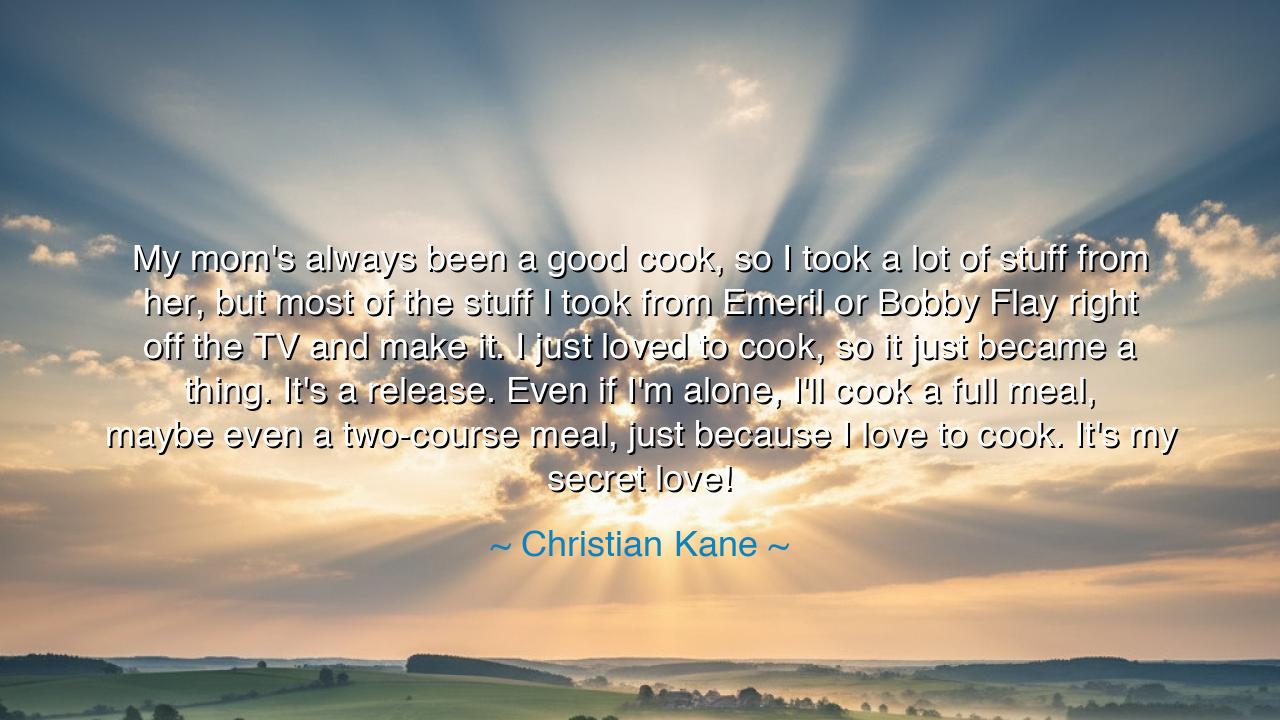
My mom's always been a good cook, so I took a lot of stuff from
My mom's always been a good cook, so I took a lot of stuff from her, but most of the stuff I took from Emeril or Bobby Flay right off the TV and make it. I just loved to cook, so it just became a thing. It's a release. Even if I'm alone, I'll cook a full meal, maybe even a two-course meal, just because I love to cook. It's my secret love!






In the warm and heartfelt words of Christian Kane, we glimpse a truth that reaches beyond the kitchen and into the heart of human fulfillment: “My mom’s always been a good cook, so I took a lot of stuff from her, but most of the stuff I took from Emeril or Bobby Flay right off the TV and make it. I just loved to cook, so it just became a thing. It’s a release. Even if I’m alone, I’ll cook a full meal, maybe even a two-course meal, just because I love to cook. It’s my secret love!” These words, though born from the simple joy of cooking, carry the essence of a universal wisdom — that creation, when done with love, becomes a form of peace, a communion between the soul and the world.
The origin of this truth lies in the ancient rhythm of life itself. Since the dawn of humanity, fire and food have been the sacred symbols of home, community, and continuity. To cook is not merely to prepare sustenance; it is to perform a quiet act of devotion — to transform the raw elements of the earth into something that gives life and comfort. Kane’s love of cooking, inspired by his mother’s hands and the televised artistry of great chefs, becomes an inheritance of spirit — the passing down of care, creativity, and self-expression. His joy in the act reveals what the ancients understood well: that creation, in any form, is the soul’s answer to solitude.
To call cooking “a release” is to understand it as a sacred ritual of renewal. For Kane, the kitchen becomes a sanctuary where thought and burden dissolve into motion — where the mind, weary from the noise of the world, finds stillness in the slicing of herbs, the simmering of sauces, the fragrance of the earth rising from the pan. This is no idle pastime; it is meditation in motion, the same discipline that the monks of old found in their gardens, and the poets in their writing. The one who cooks for joy communes with life itself, for the alchemy of turning hunger into nourishment is among the oldest miracles known to humankind.
The ancients would have revered such simplicity. The philosopher Epicurus, whose garden was both home and haven, taught that pleasure was not excess, but contentment — the peace found in simple acts done with sincerity. The Japanese tea masters, too, practiced their art with reverence, turning the pouring of tea into an act of mindfulness. Like them, Kane’s cooking is not about luxury or performance; it is about presence. Even when he cooks alone, he honors life by creating beauty from the ordinary. The solitary meal, in this light, is not an act of loneliness, but of communion — a conversation between the self and the world that gave it flavor.
Consider the story of Vincent van Gogh, who, though often alone and tormented, found solace in the act of painting. Each stroke of color was his way of transforming pain into beauty, silence into song. In the same way, Kane’s cooking becomes a form of art, a healing expression of love turned inward. To cook even when no one is watching, to prepare a feast for one’s own heart — this is a declaration of self-worth, a statement that joy does not require an audience. The one who can celebrate life in solitude has found the secret of contentment.
And what a noble secret it is — that love of creation can sustain us even in silence. Kane calls cooking his “secret love,” but such loves are not truly secret; they are the hidden roots of the human spirit, the quiet passions that keep the flame of joy alive. Every soul must find its own craft, its own art that brings peace. For one it is painting, for another, music or writing or tending a garden. Whatever form it takes, the act of creating for love alone is the soul’s way of remembering that it is alive, that it is capable of giving and receiving beauty.
Therefore, my child, take this teaching to heart: nurture your secret loves. Do not wait for company or applause to express your joy. Do what fills your spirit — create, build, bake, write, sing, or serve — even if the world does not see. The one who can find happiness in solitude is never truly alone. Like Christian Kane, learn to find release in creation, to bring peace through the work of your own hands. For it is in those quiet, loving acts that the heart finds its rest, and the divine speaks softly through the ordinary.
And so, let Christian Kane’s simple words become your eternal reminder: that joy can be found not in fame or praise, but in the small, sacred acts done in love. The flame that cooks your meal, the art that steadies your heart — these are your prayers. Keep them alive. For when the world grows heavy, it is not grandeur that saves us, but the secret loves we keep — the humble labors that feed both body and soul.






AAdministratorAdministrator
Welcome, honored guests. Please leave a comment, we will respond soon